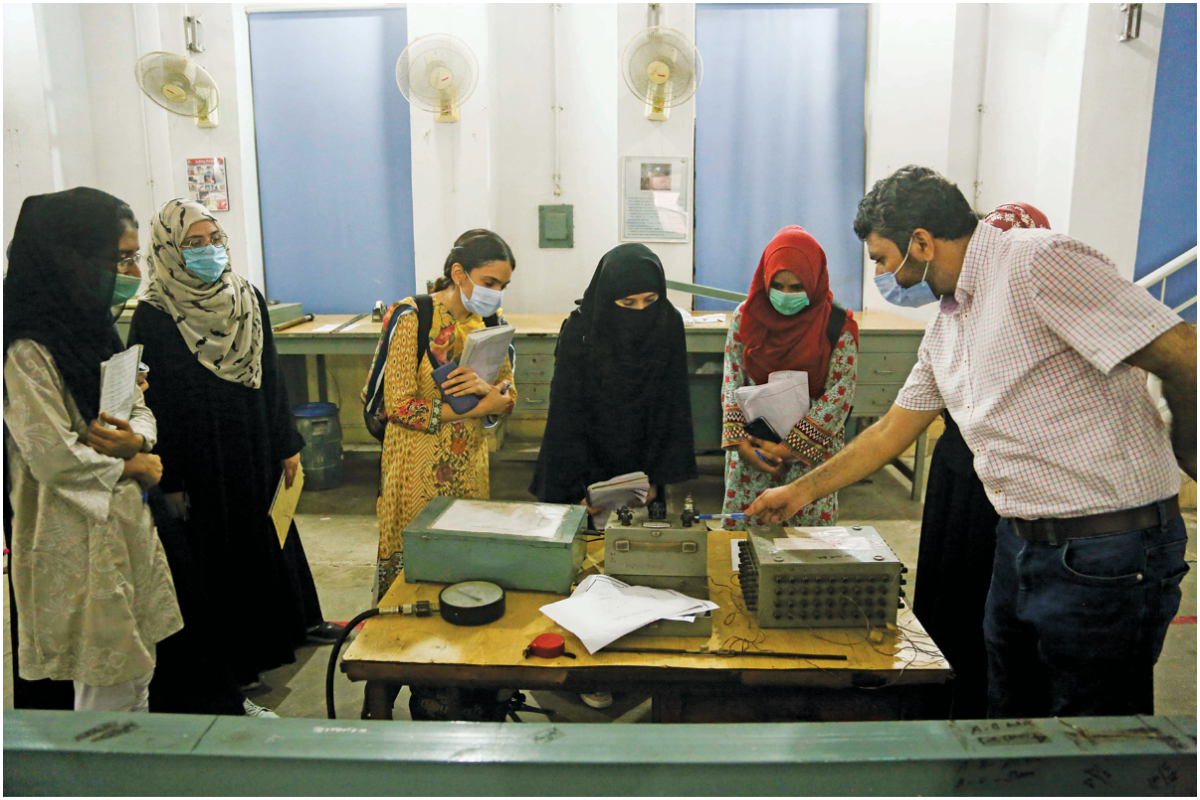
Digitising exams
BISE to digitise the examination process
Lahore: The examiners of the educational boards of Punjab are thrilled that their bone-breaking job is going to be facilitated by an errorless colleague—a computer.
The Lahore Board of Intermediate and Secondary Education (BISE) plans to digitise the examination process for all matriculation and intermediate papers. The implementation of the process may take time, but the Lahore BISE will pilot it in a mock exercise to eliminate the possibility of a fiasco in the real situation.
“On January 31, the board will convene 500 candidates drawn from 50 public schools for a mock assessment, which will be partially administered by computers,” a board spokesperson said. Preparations have been made in this regard at the board’s examination hall on Lawrence Road, near the board office.
As part of the trial programme, up to ten students from each school will take physics, chemistry, biology, English, and mathematics tests. Each paper will be divided into three sections: an objective, a brief answer, and a detailed answer. The time limit for the exam will be three hours. Once the papers have been completed, and the candidates have exited the examination hall, the computers will go into action.
A QR code will appear at the top of the first sheet of objective or multiple-choice questions. The examiner’s role in the project will be to scan the code on the page, and the marks will be calculated digitally.
Sikandar Abbas is a government school teacher who has spent the last 20 years invigilating intermediate and matriculation exams and paper-checking.
Speaking to Bol News, he explained the traditional marking method.
“Examiners congregate in a hall, usually a government office or a school; we all sit in groups, and each member is given paper sheets to check,” he noted.
He stated that the first sheet of MCQs has a unique code and a key attached to it. Examiners tally the answers and mark the papers according to the key.
“Examiners count the marks and write a total at the top of the sheet once the marking is completed. We then proceed to the short answer section, followed by the long answer section. Every single line is scanned with the human eye and marked according to the assessment criteria, and once the total is completed, the sheet is passed on to a centre sub-head. The sub-head also skims the paper, selects a paper at random for detailed inspection, and then passes the bundle on to the head examiner,” Abbas added.
According to a Lahore BISE official, paper sheets would be recognised through their QR code under the digital marking system, and candidates’ privacy would be kept paramount. The scanner would only calculate the marks and record the total. The system does not allow the sub-examiner or the head examiner to determine the identities of the candidates.
“The first step toward digital examination of papers would relieve examiners of the burden of calculating marks,” said BISE Controller of Examination Irfan Ahmad. Ruqiya Qayyaum, a biology examiner, said that calculating marks is a tedious process that necessitates precise arithmetic.
“Many times, examiners are snubbed by heads for inaccurate marking calculations, while assessment is hardly taken into consideration,” she said.
“As an examiner, I would be relieved not to have to total marks,” she added.
However, the system raises some concerns. Why has the Lahore Board limited the process to totaling marks and not checking text on the sheets when other testing agencies, such as the National Testing Service, use such software that can examine multiple-choice questions flawlessly and in no time?
According to a board spokesperson, the next phase of piloting will include the marking of objective-type papers.
Furthermore, the piloting would ensure that every question was checked and the appropriate marks were assigned, and that no examiner would submit the paper without doing both. He stated that the testing procedure would be consistent and would encourage impartial scoring.
As the boards prepare to hold exams for class 9 across the province in April of this year, officials are planning to use digital examiners for the 2023 annual exams.
Educationists have welcomed the boards’ decision, but with caution.
“Assessment, whether manual or digital, is less relevant if the candidate is evaluated based on material memorising strength,” educationist and author Syed Shamim Azam contends.
“The board tests simply assess a candidate’s ability to memorise the text; the process should assess whether or not a candidate’s concepts about a subject are clear,” she maintained. Other plans to automate the work are being pursued by the board.
According to the official, the exam fee payment process would also be digitised. Currently, candidates have to wait in line for hours at a bank to submit their fees. The online fee payment implies that instead of going to the bank to submit vouchers, candidates would simply need to submit exam forms to the board.
As a step toward transparency, they would have access to a scanned copy of the paper in the data, allowing them to inspect the paper and correct any mismanagement. The education board appears to have put itself through a digital test; let us see if it passes or fails.
Catch all the Urban Insight News, Breaking News Event and Latest News Updates on The BOL News
Download The BOL News App to get the Daily News Update & Live News.












 Read the complete story text.
Read the complete story text. Listen to audio of the story.
Listen to audio of the story.